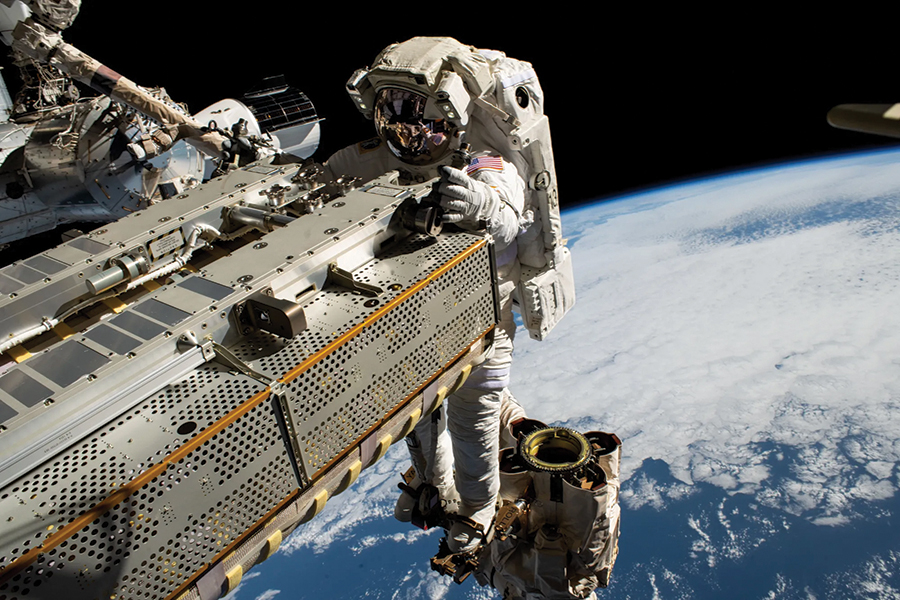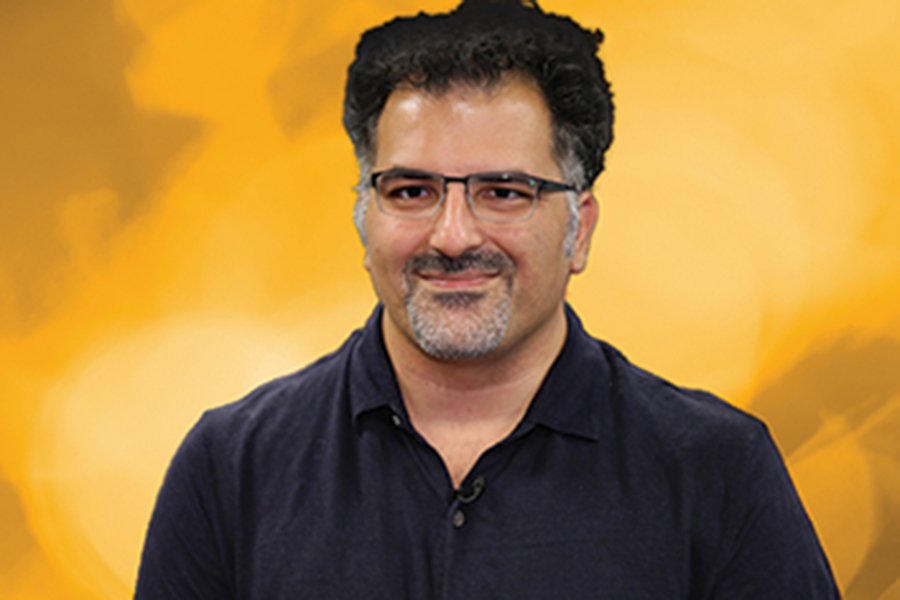Cosmic Cells
Florida State biophysics alumnus Afshin Beheshti looks to the stars to unlock mysteries of disease progression

Space may be the final frontier, but scientists like NASA researcher and Florida State University physics alumnus Afshin Beheshti are proving the cosmos can also hold answers to human medical mysteries.
Beheshti currently works with Blue Marble Space Institute of Science, BMSIS, at NASA Ames Research Center in California’s Silicon Valley, analyzing how spaceflight affects humans and looking to space to better understand disease progression and identify earlier indicators of health risks. Specifically, Beheshti works with microribonucleic acids, or miRNAs, molecules that play a large role in gene expression, and mitochondria, the cell’s powerplants, to identify cellular changes caused by disease or lengthy periods living in space.
“Space is a model for a lot of accelerated diseases, which include mitochondrial diseases, cancer risk, cardiovascular issues and more,” Beheshti said. “My background in biophysics, which uses physics approaches and methods to study biological phenomena like human health, also gives me a unique lens to understand how space travel affects the human body.”

Among Beheshti’s past projects is NASA’s GeneLab platform, now part of NASA’s Open Science Data Repository, the first database of its kind allowing users to upload, download, and share spaceflight data about human cells from experiments conducted by NASA scientists as well as recipients of NASA grants, free of charge. Discoveries made using GeneLab helped scientists better understand the foundations of many cellular anomalies that result in disease as well as prepare astronauts to withstand the rigors of long-duration spaceflight.
“Working on GeneLab allowed me to explore how to creatively use existing data to produce novel and important findings,” said Beheshti, who earned a bachelor’s in high-energy physics at the University of Minnesota in 1997 before coming to FSU for graduate school. “GeneLab expands the possibilities of open science and allows people who don’t have NASA grants or the ability to send samples to space to explore data in this field.”
Beheshti always wanted to pursue research to enhance people’s quality of life, but he wasn’t sure of the approach until an FSU adviser explained how being a physicist allows you to be a jack-of-all-trades, viewing different disciplines through the lens of physics to better understand the fundamentals of each. He completed his master’s degree in physics here in 2001 on the way to earning a biophysics doctorate.
“While at FSU, I worked with professor of physics David Van Winkle on how DNA moves through structures in the body,” Beheshti said. “The technical skills I developed allowed me to pursue postdoctoral research in the medical field outside my realm of experience. After I graduated in 2002, I completed one postdoctoral appointment in an oral microbiology lab and another in a cancer systems biology lab.”
“I love what I do so much that it doesn’t seem like work. My hope is that the work I do makes a small dent to improve life everywhere.”
— Afshin Beheshti
Following these experiences, Beheshti accepted an assistant professor of medicine position at Tufts University in Massachusetts. During this time, he was also an associate investigator at St. Elizabeth’s Medical Center overseeing microscope facilities before transitioning to assistant professor of medicine at Tufts Medical Center.
There, Beheshti developed a technique to use miRNAs as biomarkers — measurements like pulse rate, body temperature, and blood pressure used to assess a patient’s condition — to potentially identify disease earlier in the diagnostic process. Beheshti discerned a miRNA signature associated with diffused B cell lymphoma, a finding that bolstered his work in the field: By learning a key miRNA signature, Beheshti can monitor disease progression.
“In my current lab at BMSIS at NASA, through the grants I’ve obtained, I’ve adapted this miRNA technique to determine a particular signature caused by space radiation and microgravity,” Beheshti said. “This miRNA signature indicates health risks caused by the space environment, and I hope to use this research to determine when the point-of-no-return occurs regarding astronaut health risks. By showing these miRNAs are good biomarkers and developing ways to mitigate physiological damage in space, we can apply these techniques to a clinical context on Earth.”
Utilizing research from his colleague and a founder of the field of mitochondrial genetics, Doug Wallace, Beheshti analyzes key mitochondrial changes occurring due to different diseases and the effects of spaceflight. The two first met when Beheshti reached out to Wallace for assistance interpreting some mitochondrial alterations — the findings indicated spaceflight suppresses mitochondrial activity in humans and impacts energy levels and job performance in space.
“Afshin is a committed and enthusiastic leader and scientist who is highly collaborative and inclusive,” said Wallace, director of the Center for Mitochondrial and Epigenomic Medicine at the Children’s Hospital of Philadelphia Research Institute and a member of the National Academy of Sciences. “He is an expert bio informaticist talented in applying computational tools to a wide range of biomedical problems.”
While Beheshti’s work necessitates he think beyond our atmosphere, he remains grounded by focusing on the molecules comprising the human body and enjoying his day-to-day research.
“I love what I do so much that it doesn’t seem like work,” Beheshti said. “My hope is that the work I do makes a small dent to improve life everywhere.”
Devin Bittner is a two-time FSU alumna who earned a Master’s in Business Administration in 2022 and a bachelor’s in digital media production in 2019.
McKenzie Harris is a two-time FSU alumna who earned a master’s degree from the College of Communication and Information in 2022 and a bachelor’s degree from the Department of English in 2020.
